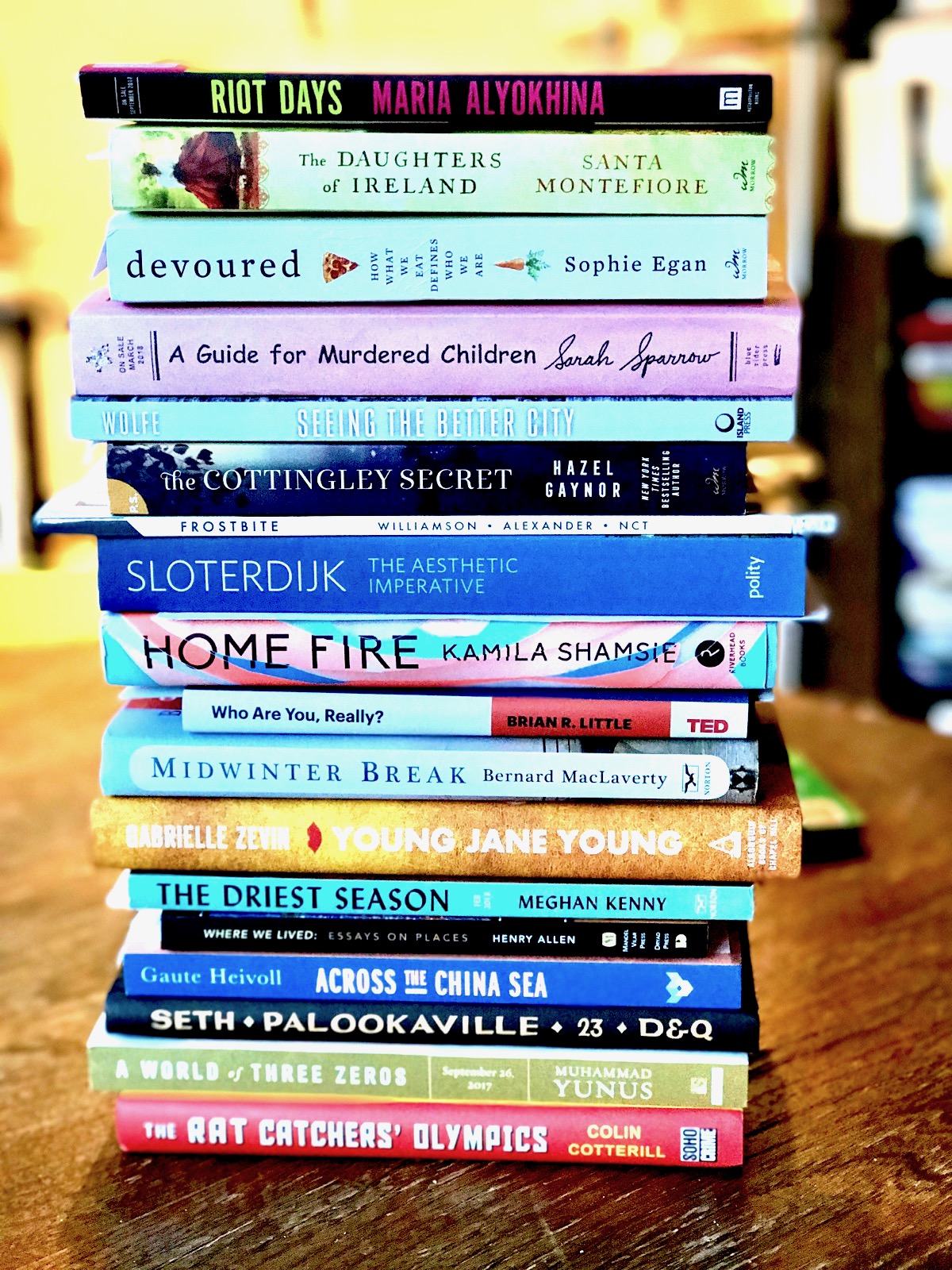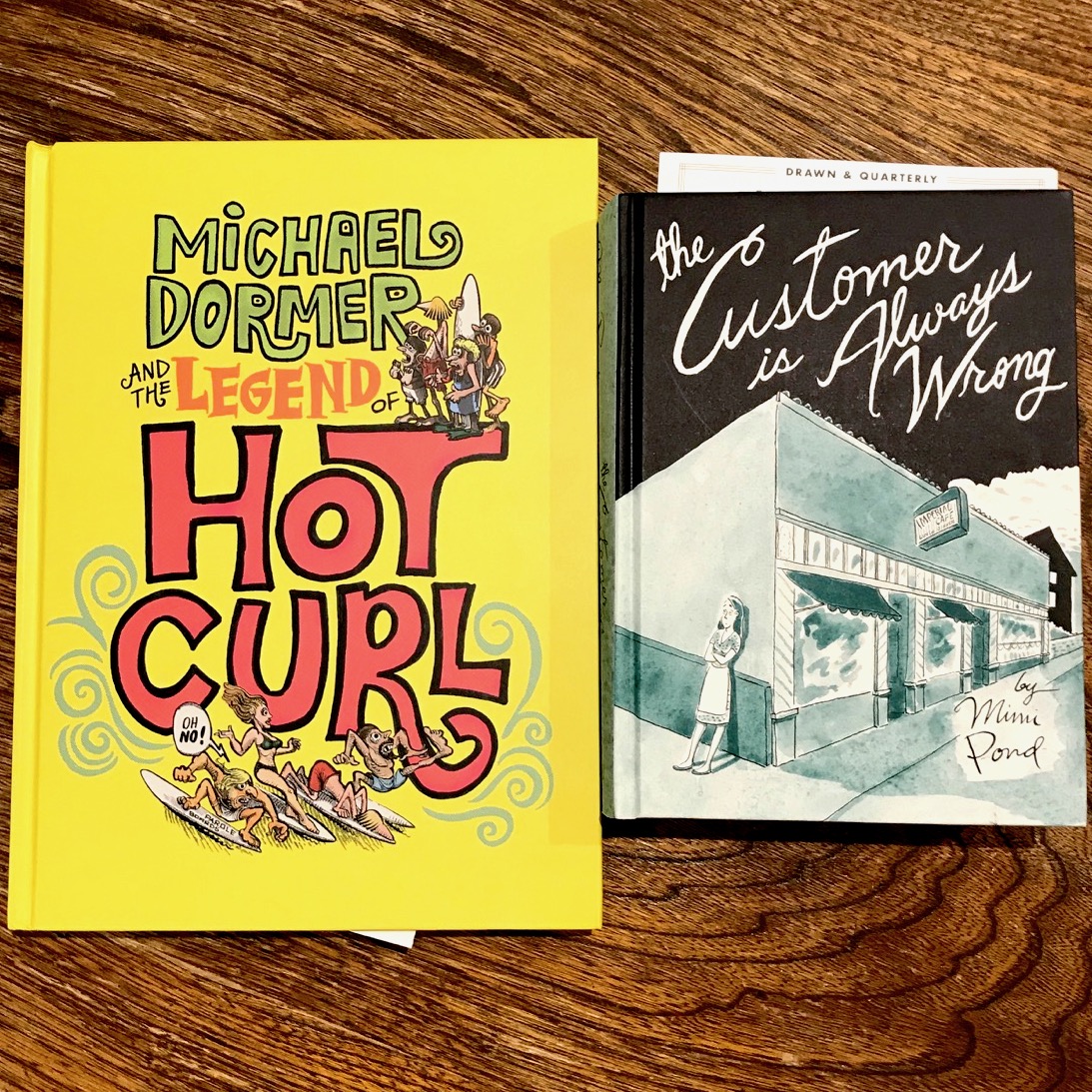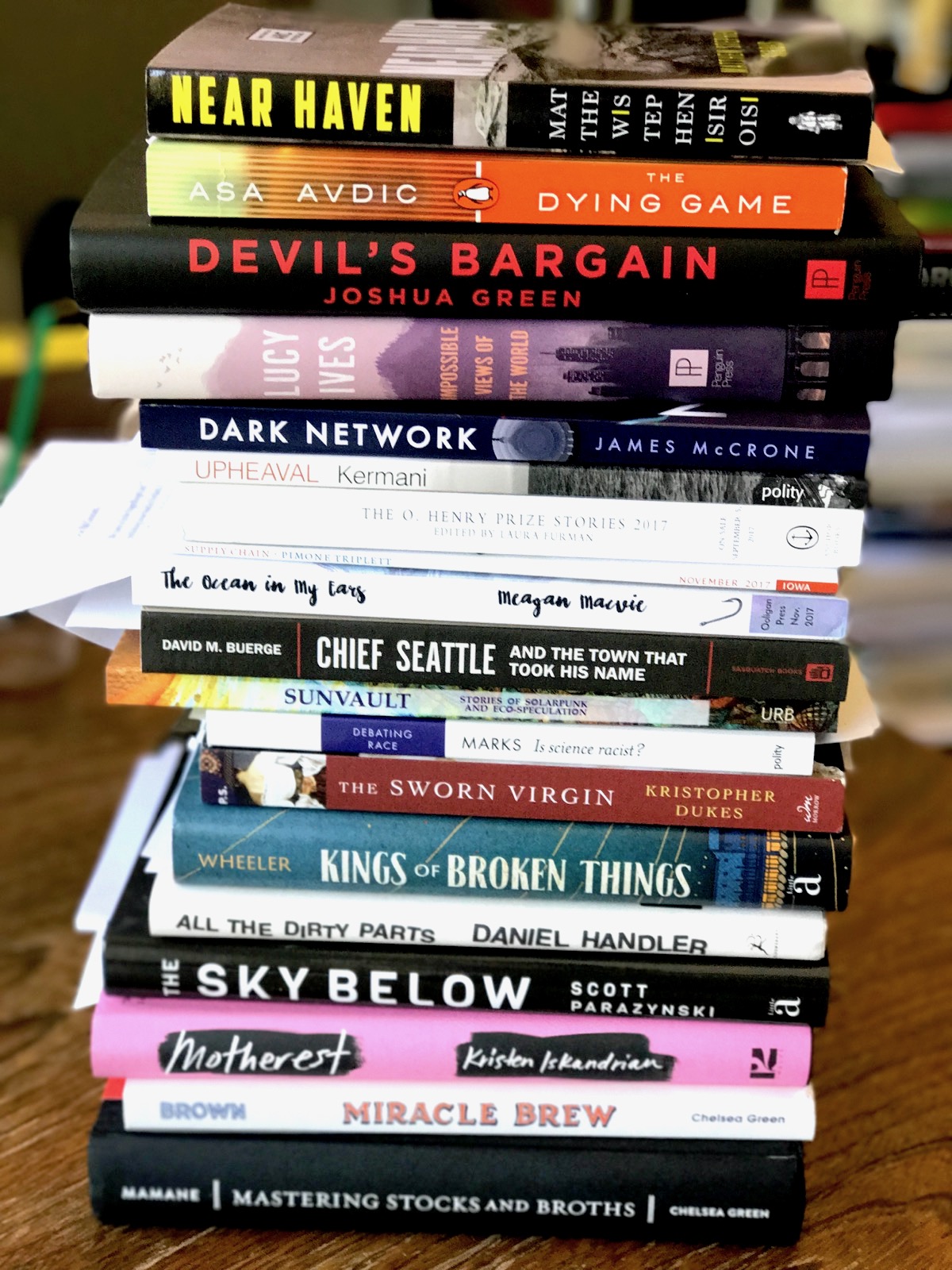Happy birthday, Seattle Review of Books! An interview with the co-founders
Today the Seattle Review of Books celebrates its second birthday — two years of publishing original writing about books with a uniquely Seattle flavor. To honor the anniversary, the site’s co-founders met up in their favorite habitat, a Slack channel, for a wide-ranging conversation about the city, its writers and readers, and the future of book reviewing.
If you haven’t had the pleasure of joining a conversation with Paul Constant and Martin McClellan, I hope you enjoy the one below as much as I did. A relative newcomer to the site, I went in with a sheaf of notes and an immaculate interview plan. Ninety minutes later I staggered out, slightly stunned but delighted — and eager to see what Seattle’s most passionate book nerds take on next.
Congratulations! Two years, almost 200 reviews! And all sorts of interviews and notes. Probably thousands. Too many to count.
Paul: Thanks! These last two years seem to have gone by so fast.
Martin: It's a little more than 2,000 notes, interviews, columns, and such.
Paul: Sometimes I look at my author page and try to figure out how I found the time to write all that.
Martin: I can now confess I helped start the site just so I could read Paul's writing more. It was entirely selfish.
It’s an obvious place to start, which isn’t at all in the spirit of the site — but I love the story and you just gave me an opening, so let’s do it anyway. How did the Seattle Review of Books get launched?
Paul: I’ve told this story a few times, and it’s slightly different every time. I’d be curious to hear Martin’s version.
Martin: I actually was a big fan of Paul's writing at the Stranger. I ran into him a few times around town and we struck up a friendship. At the time I was working for a media company, so we had things in common other than loving books.
When he left the Stranger I sent a joke tweet his way that he should start the Seattle Review of Books. We met up to have dinner a bit later, and the joke got a bit more serious. I guess, as Al Franken puts it, I was kidding on the square.
Sitting there at Le Pichet I looked up the domain registry for seattlereviewofbooks.com, and was shocked to find that nobody had ever bought it. We jokingly made an agreement that we’d co-own the URL, and Paul handed me some cash. We shook hands, and I bought it.
We sat on it for a bit, kind of sending notes back and forth like "Well, if we did, what if we . . . ?" and to our immense pleasure (or, at least mine), all of our ideas were simpatico. So we talked more seriously, then each put some money in and defined what our roles would be, and started building the site you're reading now.
Paul: Yeah, my version of the story involves a car chase and some microfiche stashed into a hairbrush handle, but that’s about the gist of it.
I want to be clear, though: Martin came up with the name of the site, he built it with his own two hands, he designed it. Without him, the Seattle Review of Books wouldn’t exist. I’d probably have a Tumblr called “Paul’s Bookish Musings” or something like that and it would be red type on a black background and nobody would ever read it.
Beyond no one owning the name or the domain yet — what was the thing you were trying to make, that nobody else had made?
Martin: I would have read it. But I would have complained about the typography.
The thing, I think, that we both wanted was a place that celebrated writing and lit culture in Seattle as a primary thing. Not as an afterthought or a tie-in.
We both wanted a place that celebrated writing and lit culture in Seattle as a primary thing. Not as an afterthought or a tie-in.
Paul: Yeah, exactly.
After nearly two decades here, I know that Seattle is the best, most interesting literary city in the United States. At the same time, I was seeing nearly every outlet diminish or eliminate their books coverage.
Martin: I loved the way Paul always said it: that we wanted to reflect the average Seattle reader’s shelf. So, comics next to "serious" novels, next to fun reads next to poetry. Diverse, and geared towards the interest of a general reader.
Paul: Seattle has the best readers in the country, too, for sure.
Martin: For sure! And the most fun-loving book crowd. It's very open and accepting of everybody, and there's something happening every night.
Paul: You know, I don’t think I’ve talked about this with Martin, but I had a real anxiety that in twenty years someone would move to Seattle and start a publishing company and they’d not know about the rich history they were building on.
A lot of Seattle’s literary history is just missing. Unless you’re talking about Raymond Carver or Richard Hugo, a lot of those figures are starting to disappear into the mists of time.
I think something we’re doing here is making a record: This is what Seattle was like at this time. These are the people who made Seattle such a terrific place to live. These are the writers who maybe never scored a giant publishing contract but who were making incredible pieces of work. They existed, they mattered, and they added to this amazing continuum.
So sometimes I’m not even writing for the audience right now. I’m recording something for posterity.
Martin: When we were starting the site, I was talking to typographer John D. Berry, and he was telling me about publishing the Pacific Northwest Review of Books in the early seventies. That history is missing, there's so much still to capture!
Paul: Yeah, and there’s maybe one copy of that Review in Knute Berger’s basement.
Martin: I'll bet Knute Berger's basement is like the warehouse in Raiders of the Lost Ark. But every box is full of trees.
Paul: And Wheedle on the Needle merch.
Martin: And vintage Metro buses.
But, I want to turn the question around. Dawn: you were an early reader of the site. You saw it from the outside. What drew you in and kept you reading?
It was the inimitable and irrepressible personality of the site that made it stand out. So much of book reviewing is — it’s not fair to say it’s cookie-cutter, but it’s from a certain cloth.
I think it was one of your reviews, Martin, where you said “We like to say that a book review is the only type of review done in the method of the thing it is reviewing.”
Martin: That's one of Paul's lines. It's probable I stole it.
Regardless: the reviews I was reading on SRoB were interesting in and of themselves, as pieces of writing.
Martin: I'm glad to hear that. That was always important to us, that reviews be good pieces of writing that stand alone.
Paul: I mean, my dirty little secret is that I don’t read many other review sites. Because I find most book reviews to be awful.
Paul, I was trying to be diplomatic.
Martin: You may be surprised to learn that people who started a review site have strong feelings about reviews.
Paul: I don’t need some random dude on the internet to give me a Consumer Reports-style guide or a plot summary. I want them to contextualize the book and argue with the book and point out something I didn’t notice about the book.
I love books and I love talking about books. And I love writing about books. A lot of people don’t believe me when I say I’m not a failed novelist. I’m a reviewer. I’m a book person. I like to think and write about books. And I know I’m not alone.
People always think reviewers are bitter, failed fiction writers. And I guess a lot of them are. But they shouldn’t be writing reviews. They should be getting better at writing fiction.
Martin: So, I guess this is a good time to mention that I'm a novelist.
Not failed, is the key thing.
Martin: True! Not yet. I have that to look forward to. Us people who work in startups, we like failing. We've built a mythology around it.
Paul: And if I may contradict myself: I think novelists are some of the best book reviewers. I always use Colson Whitehead’s review of Richard Ford’s A Multitude of Sins as one of my favorite (and most deserved) literary takedowns of all time.
Martin: And didn't he get punched for it?
Paul: Ford spat on him at a party.
Martin: Even better!
Two years in: is this what you expected?
Paul: Yes?
I mean, I was surprised and pleased by the outpouring of support that we received when we first announced. We were covered by most outlets in town: The Seattle Times, Seattle Magazine, Seattle Metropolitan, City Arts.
They didn’t have to do that. Technically, we’re their competitors.
Martin: That was very gratifying.
Paul: Yeah. It was a little like getting to read your obituary early.
So we were off to a much bigger start than I expected, which was great.
But these first few years, I knew, would be a real heads-down kind of do-the-work period. Make sure we have new stuff on the site every day. Remind people we’re here. Break news sometimes. But be on time, and have something interesting to say, and be as comprehensive as you can. A media outlet has to prove itself by showing up. You can’t have dead days. You can’t drop the ball.
So we’ve been reminding people that we’re here, and we’ve been trying to be good citizens. Good neighbors.
What does that mean? Other than keeping the music down after 10 p.m. and making sure your garbage cans aren’t in the street?
Paul: It means letting people know they can come to us when they need help. It means keeping an eye on the community and spreading the word when someone’s done something worth celebrating.
It means letting people know they can come to us, and expecting us to show up when they need us.
We’re a news site, but we’re also a community resource.
We might run negative reviews and write news stories that annoy people from time to time, but I don’t think anyone can doubt our commitment to books in general, and to Seattle in particular.
That’s the kind of work we’ve had to do in the first few years, and that we still need to do.
Martin: Yeah, we set the stage with what we have done.
With two years under our feet — and, it's worth saying, two profitable years thanks to our incredible sponsors — we're not a fly-by-night affair.
We are a written-by-night affair, however. Mostly.
Paul: I’m basically fused to my couch at this point. Though I’ve stopped falling asleep while typing in mid-sentence, which I take to mean I’m getting better at managing my time.
Martin: I want to talk a bit more about sponsorships for a minute. Because one of the frustrations of working on the web was terrible, terrible, terrible advertising. There is no reason that advertising needs to be terrible. We have a site about reading. Let's give people something to read.
Having a bright line between sponsorship and editorial content was important for us, but also that sponsorships were attractive, didn't riddle your computer with cookies and trackers and third-party nonsense. That we respected our readers as intelligent people who might actually like to find out about some books or events they're into.
Because of doing that, we've been able to sustain the site and pay poets to appear on the site every week, and hire writers.
So please do read our sponsorship each week. If you like them, great! If not, the only thing you've lost is a few minutes of your time. You might just discover a book you absolutely love.
I am curious about what, specifically, you’d like to do over the next few years. If this were the five-year anniversary interview, what would you want me to ask you about?
Martin: I don't want to promise anything specific; sometimes you can deliver on promises, and sometimes you can't. But here are a few things we hope to see: a more robust calendar, more events — like our book club — where we can get out and see people more original fiction on the site — we're running our first short story writing contest now.
Paul: I agree with your recent interview, Dawn, where you said you wanted to see more voices on the site. And that’s why I’m grateful to have you as our associate editor. I love working with new writers, but running a site in addition to a day job is a lot to do.
So to have you working with new voices is wonderful. Without new writers, we’re just kind of treading water. I hope all sorts of people will reach out with weird and fun pitches. Especially young writers who maybe don’t have a byline anywhere else. I’d like to see us become a place that sends new talent out into the world.
“Weird” is my favorite of the words you use to describe book reviews.
Paul: It’s vague, but you know a good, weird book review when you see it. It’s the kind of thing that makes readers say “you can’t do that in a book review . . . can you?”
Turns out, you can!
Martin: I think one of the things that we see a lot is people writing book reviews like they think book reviews should be. That's the wrong approach with us.
Paul: That’s one of the hardest things to do with new writers, is to untrain them from thinking that a book review has to be dull and formal and stuffy.
Or to let them know it’s okay to do what they wanted to do anyway.
Martin: Or that it has to talk about the book at all. Okay, maybe a little. But try us.
Paul: Please!
Martin: I can imagine reading an absolutely delightful review of a Jonathan Franzen book that doesn't talk about the book or the writer at all, for example.
Paul: Any review that doesn’t mention Jonathan Franzen is a delightful review!
Martin: I'm interested in the writer. What is it that the writer brings? Why are they the right person to write the review? How do they see the world through the lens of the book?
Give me an example.
Martin: Here are a few reviews that stand out (although I love every review we've run):
Arthur Wyatt's personal Brit-splaining of Judge Dredd and how he came to write for the comic, Doug Nufer's formal poem critique of The Drone Papers, Bonnie Rough's sensitive and lovely look at death with Abigail Thomas' What comes next and how to like it, just to name a few. Your review, Dawn, of Marie Kondo's book, is a review about people and hard things and coping.
None of them are conventional reviews, really. They don't open with a "here's a thought about the writer, here's a summary, here's a synopsis of what I just told you." They're explorations of the world of the writer through the book.
Paul: I also love Anna Minard’s nerdy (but canny!) love letter to Ruth Bader Ginsberg.
The thing I want to ask, that I’m not quite sure how to get at, is how the context for SRoB is changing — and how that affects your vision for the site. And by context I mean the Seattle literary world, and the environment for books, booksellers, and people who read and write about books.
Paul: That’s a good question. Though a lot of folks in the literary world here like to recall a halcyon time when the Seattle literary world was stable and ever-growing, the truth is that time never existed. Bookstores and venues are always opening and closing. Writers are coming to town, writers are leaving town. Things will be very different in five years, but that’s always the case.
I think our role is to reflect those changes, and mourn the people and institutions that fade from view, and to celebrate the new ones that rise up.
The city is suffering an affordability crisis right now, and though politicians have paid tremendous lip service to writers and other creative types, not much has actually been done to ensure that they can live here.
We should absolutely reflect that in the site.
And we do have the 800-pound gorilla of the publishing industry headquartered in South Lake Union, and we have to acknowledge that.
So we have to advocate for the city we want, in the face of all this prosperity and discomfort and squalor.
We have to advocate for the city we want, in the face of all this prosperity and discomfort and squalor.
Martin: I really, really wish Amazon had some competition in digital books. There is such a lack of innovation anywhere else in publishing in that space, it's disheartening.
Paul: Right! We have a “disruptor,” to use an awkward tech word, in the audio book space here in Seattle. Libro.fm is a local company that’s trying to bring independent bookstores in on the audio book sales front. I hope someone is doing similar work with ebooks, and I hope they’re based here in Seattle, too.
Martin: There's another aspect of the site I want to mention, and that's that we're completely independent. We're not built on another's publishing platform.
We use Facebook and Twitter to spread the word, but as we were coming out, there was a huge migration to Medium.com, and now publications are moving away from it.
It's true that running a website is hard, and it's especially hard to make money, but we're also living in a time where publishing is easier than it has ever been in history. We want more people starting sites and publishing original content. We want more people, of all different backgrounds and views, making sites about books and what they love.
I hope to see many more people breaking out of those walled gardens and building their own worlds.
We want more people, of all different backgrounds and views, making sites about books and what they love.
Final question. And it’s an easy one. Pinky swear. No, wait. I have two. Clearly no respect for the pinky swear!
First: What should I have asked you that I didn’t?
Paul: Well, uh, I don’t know what you should’ve asked that you didn’t, but I know that I’d like to thank all our amazing columnists. I can’t believe that we get to publish the incredible Nisi Shawl on a regular basis! She’s one of the most exciting sci-fi novelists in the field today and she’s an upstanding figure in the Seattle sci-fi scene and she works with us? What the hell?
Martin: For sure, and we have a new column starting next week that I'm so excited about.
Paul: And Daneet Steffens’s mystery column is pure joy. She has such a deep love and understanding of the genre that it’s infectious. I learn so much from reading her column.
Christine Marie Larsen’s Portrait Gallery adds a much-needed visual element to the site, and it’s a fantastic way to celebrate local authors. Her work has been on the site since day one — we have the best 404 pages — and I think the color and life and energy she brings to her paintings is as much a guiding star for the site as any prose we’ve published.
Martin: Yes! Christine is so great. She's done about eighty original paintings for us, which is astounding. It makes me so happy to see her portrait every week, and I'm so grateful for her work.
Paul:And I’m sure we’ll have more terrific columns in the future (pitch us!).
But I especially have to get mushy and thank Cienna Madrid for being with us from the very beginning and writing the best damn advice column in the world.
Martin: Cienna Madrid is so damn funny.
Paul: SO funny. And sometimes she’s so mean that when she demonstrates real compassion it just knocks you on your ass. Getting her column in my inbox is a highlight of my week, every week. And she was writing for us back before anyone even knew this site existed.
So at the risk of sounding like I’m taking a victory lap or giving an Oscar speech, I just want to publicly gush over how lucky we are to have her.
Closing words for SRoB readers?
Paul: Thank you for reading! And thanks for sending in tips and questions and Facebook and Twitter comments. Your thoughts and opinions matter a great deal to us. This is your site, and we take your comments and criticisms really seriously. And we’re so grateful for all your support.
Martin: I want to echo Paul's thoughts, exactly. Putting this site together and working on it every day is a passion, and it's because we have such amazing readers. We love hearing from you, so write in and tell us what you think, what you want to see more of, what you want to see less of. We want to hear.
Thank you so much for reading. And if you see us out at an event, come up and say hello.
They look threatening but are actually quite nice.
Paul: I have resting glower face.
Martin: I have resting at-home face. Because I go out much less than Paul. But talk to me if you see me!
And with that, I think we can close. Yes?
Paul: Yup.
Martin: ...and scene!
The Kakutani era of book reviewing at the New York Times has ended
Joe Pompeo at Vanity Fair:
Vanity Fair has learned that Michiko Kakutani, The New York Times chief book reviewer and Pulitzer Prize winner, who has been, by a wide margin, the most powerful book critic in the English-speaking world, is stepping down. Her final review, on the debut novel by Nigerian author Ayobami Adebayo, was published on Tuesday.
I'll likely have more thoughts on this at a later date, but here's my first impression: even people who don't typically read book reviews in the New York Times — here, I raise my hand meekly — have to acknowledge that this is a big deal for American literature. Kakutani is the closest thing to a household name that the book reviewing world has. The next person to take her position will enjoy a tremendous opportunity to represent literary criticism to the general public. Hopefully, the next editor will lead book reviewing into the 21st century with creativity and enthusiasm.
UPDATE 10:17 AM: This post has been updated because I believed some idiot on Twitter about Kakutani's replacement. Sorry about that. I'll try not to believe Twitter randos without double-sourcing next time. No replacement for Kakutani has been named, though critic Parul Seghal has been elevated from NYT Book Review senior editor to a critic position at the daily Times.
Thursday Comics Hangover: Coates check
I have to admit something: I loved the first issue of Ta-Nehisi Coates's Black Panther, but the series has largely lost my interest in the intervening year-and-a-half. That first issue was a perfect balance between pop-culture philosphy and superhero action, and Coates seemed to be attempting a more stylish version of a text-heavy style of comics writing that we haven't seen in mainstream comics since the 1980s.
But gradually, over the next few issues, Coates's writing went from wordy to overindulgent to bloated. Long stretches would happen where people would talk in self-important prose and all the important story beats seemed to be happening off-panel. The recap pages would contain more palace drama than the actual comics pages.
And to cap it all off, Brian Stelfreeze, the artist who started Black Panther with Coates, seemed to entirely disappear. Stelfreeze has always had difficulty hitting a monthly deadline, but this book used so much of his visual language that when he stopped drawing the title, the characters seemed to lose their motivation with him. I ordinarily adore Chris Sprouse, the artist who has taken Stelfreeze's place, but Sprouse's superheroic figures, who always seem ready to leap off the page their impossible musculatures and lantern jaws, feel badly mismatched with Coates's action-free scripts.
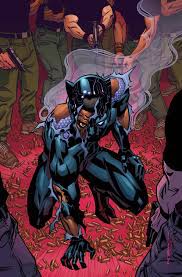
All that said, the latest issue of Black Panther, #16, is the most exciting issue in a long time. In just a few pages, Coates manages to reinvigorate a background character from the Marvel Universe in a way that feels entirely authentic and thought-provoking, yet still true to the character. The few scenes with this character combine social commentary, some fun writing, and a genuine passion for the Marvel Comics framework.
But it's not enough to salvage the whole issue. Back-up characters appear and disappear with no explanation. The story wants to raise stakes without actually investing in building the drama, and Coates can't seem to find a working rhythm for the book.
Perhaps Black Panther reads differently in trade paperback; it's possible that it flows better when given the same attention one would apply to a novel. But as a monthly comic, it's consistently the least interesting book in the stack I bring home from the comic shop. The great promise of that first issue feels squandered.
I'm not crazy about the title, but I like the cover a lot:
Hillary Clinton's new book "What Happened." will be released September 12, 2017. pic.twitter.com/b22HvxGTO1
— Anthony Dominic (@tmzanthony) July 27, 2017
Will Clinton go on a book tour? Seems likely. Stay tuned!
Go say goodbye to Horizon Books
Long ago, the Ada's Technical Books space on 15th Ave used to be a used bookstore called Horizon Books. In 2009, Horizon moved to an underground space on 10th Avenue between Pike and Pine. And now, this message from Horizon bookseller Don Glover started circulating on social media:
Fellow booksellers, friends, and long time customers, It's come that time, to finally close the shutters, and hinge the doors of Horizon Books, but it's been a grand run these past 47 years. Come join us for one last jaunt - 50% off sale through July, with deeper discounts through August, and always a deal to be made if you're loading up. 1423 10th Ave Studio A - Between Pike and Union, down the loading ramp, in the basement level, open most days 12pm-5pm. Feel free and give Don a ring at 206 523 4217, and stop on in.
Horizon is one of those bookstores that will horrify people with OCD tendencies: if the shelves were ever alphabetized, you'd never know it now. But Glover knows his stock well, and if you're looking for a particular subject, odds are good he can help you find it. It's always sad when an eccentric bookstore closes, but I don't want to get too maudlin over Horizon closing: 50 years of bookselling is quite an achievement. Go enjoy what you've got while it's still there.
Your Week in Readings: The best literary events from July 26th - August 1st
Wednesday July 26th: Pleasure to the People
“Pleasure to the People: Stories of QTPOC Sex and Love” is a storytelling night sponsored by Gay City, Planned Parenthood, and Hugo House. An amazing cast of local writers including Anis Gisele, Imani Sims, Storme Webber, Briq House, and Chad Goller-Sojouner share their stories to start a conversation about race, queerness, and sex. Northwest African American Museum, 2300 S Massachusetts St, 518-6000. http://naamnw.org. Free. All ages. 6:30 p.m.Thursday July 27th: Among the Living and the Dead Reading
University of Iowa creative nonfiction writer Inara Verzemnieks reads from her new family history, Among the Living and the Dead: A Tale of Exile and Homecoming on the War Roads of Europe. It’s a story of how her family traveled from Latvia to Washington state, where she was raised. Seattle Public Library, 1000 4th Ave., 386-4636, http://spl.org. Free. All ages. 7 p.m.Friday July 28th: Rules for Walking Out Reading
See our Event of the Week Column for more details. Couth Buzzard Books, 8310 Greenwood Ave N., http://buonobuzzard.com. Donation. All ages. 7:30 p.m.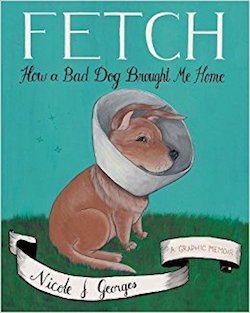
Saturday, July 29th: Fetch Reading
Portland cartoonist Nicole Georges’ comic strip starring anthropomorphic dogs was one of the best parts of the recent Grab Back comics anthology. Tonight, she debuts a memoir about a non-anthropomorphic dog, Fetch: How a Bad Dog Brought Me Home. It’s about her attempts to save a troubled dog. Elliott Bay Book Company, 1521 10th Ave, 624-6600, http://elliottbaybook.com . Free. All ages. 7 p.m.Sunday July 30th: Freeway Park Walking Tour
Freeway Park is Seattle’s creepiest park, but it’s also kind of impressive. It was the first lid to go over a freeway in the United States. Your guides will walk you through the history of the park in a tour that will span more than five acres. Brutalism never looked so inviting. Freeway Park, http://www.atlasobscura.com/events/freeway-park-walking-tour. $15. All ages. 1 p.m.Monday July 31st: Mapping the Impact of Racism in Seattle
Science on Tap is a monthly conversation about scientific topics. It’s been happening at the Ravenna Third Place for years, though it recently moved from the pub upstairs to the Vios Café. Tonight’s session has a very non-controversial title: "Mapping the impact of racism in Seattle: Have we moved past it?" Third Place Books Ravenna, 6504 20th Ave NE, 525-2347 http://thirdplacebooks.com. Free. All ages. 6 p.m.Tuesday August 1st: The Tropic of Kansas Reading
Seattle author Nisi Shawl interviews Christopher Brown about his novel, which imagines a Kansas as a demilitarized zone at the center of a ruined United States of America. A brother and sister who are hiding state secrets wander through the wasteland in an attempt to get to New Orleans. Third Place Books Lake Forest Park, 17171 Bothell Way NE, 366-3333, http://thirdplacebooks.com. Free. All ages. 7 p.m.Literary Event of the Week: Celebrating Crysta Casey
Beloved Seattle-area poet Crysta Casey passed away in 2008, but her work is very much alive. Casey wrote poems about herself and her self: she wrote openly and with great energy about her schizophrenia, and her cancer journey. Her work was vital and personal and incredibly strong — there’s probably no greater indicator of the power of Casey’s writing than the fact that her dearest friends are still safeguarding and expanding her legacy. They’ve recorded her work and published it and read it at readings and done everything they can to keep it alive.
Two short primers of Casey’s work, Celebration and Yesterday My Name Was Wine Bottle, are available for free on the Apple iBookstore. Floating Bridge Press published a chapbook of her work titled Green Cammie two years after her passing, and this month Cave Moon Press has published Rules for Walking Out, the collection she completed just before her death.
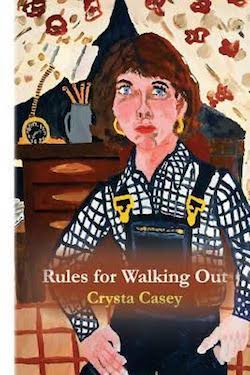
Casey referred to herself as “Resident Poet,” a vague title that somehow perfectly captured the specificity of her situation. She was Seattle’s resident poet, walking the streets and reporting back on everything that she’d see. In “Poem for an Unknown Soldier” in Celebration, Casey notices an American flag at half-mast. she doesn’t know who the gesture is supposed to mourn and so she asks a nearby woman “who died?” She responds:
“Orville Reddenbacher did,
but I don’t think they’d fly a flag
for a popcorn man.”
The poem ends in uncertainty:
I listened to the radio, waiting
for the news.
There’s a dread to this line, imagining Casey hanging by the radio, waiting to put a name to the unidentified death floating out there in the aether. But there’s a comedy to it, too, a funeral for nobody, a symbol of mourning that could just as easily be the end result of a park staffer who’s too lazy to pull the damn flag all the way to the top of its pole.
Here in the haunted present, though, we absolutely know the name of the soldier we’re mourning. This Thursday, the 28th, Greenwood’s Couth Buzzard Books hosts a release party for Rules for Walking Out with readings by many of Casey’s closest friends and fans. Trisha Ready, Jamaica Baldwin, Kym Littlefield, and Esther Altshul Helfgott will read poems by Casey, and harpist Monica Schley will interpret her work through song.
Casey was an avid reader and an enthusiastic audience member at readings all around town, so it’s fitting that the event will end with an open mic. She’d want every poet to feel welcome at this event. In Casey’s Seattle, everyone is a poet-in-residence.
Couth Buzzard Books, 8310 Greenwood Ave N., http://buonobuzzard.com. Donation. All ages. 7:30 p.m.
We the poems
Published July 25, 2017, at 12:15pm
Government-sponsored poets are defining Seattle and Washington State. You couldn't ask for a better investment of your tax dollars.
Book News Roundup: United Airlines vs. Comic Con nerds
The host of the computer science book club at Ada's Technical Books has written a great Medium post about why you should start (or join) a computer science book club.
In what may be one of the greatest instances of architectural trollery in history, someone built a Parthenon out of banned books on the site where Nazis burned books in 1933.
This person thinks e-books are on the way to being a "dead format."
This person disagrees.
The next book from George R.R. Martin will arrive in 2018. Supposedly.
After San Diego Comic Con, United Airlines tried to ban comics in checked bags. It didn't go well.
“While TSA is recommending that customers keep their comic books in their carry-on bags, there are no restrictions on packing them in checked luggage,” reads the statement. “We misunderstood TSA’s instructions and regret any inconvenience this may have caused our customers.”
- Speaking of comics, a glowing corporate profile of the CEO of Amazon's ComiXology platform at Forbes does yield one interesting piece of information: the number of women reading digital comics on ComiXology "has doubled since 2011." Angry white men are going to have to realize at some point that this playground isn't just for them anymore.
Luck
like a heavy freight train
is headed towards you,
but you are running, trippingover its tracks. You hope luck
is the taxi ready to pick you up,
but luck’s the subway, luck’sthe bus with the accordion
middle. You wait
for luck, thought you boughta ticket, thought the cab
would stop. At the airport
you hold a sign, WelcomeLuck! But everyone passes,
luck passes, doesn’t stop,
and you are leftwith your sign and a moment
of hope when you think
you’ve found luckin your pocket, but luck is down
the street in the Horseshoe
Tavern, so you peek insideand see it — luck, in its shy suit
drinking a beer
with your best friend,and they are taking selfies
with their smartphones,
and you holdingyour paper map,
hoping luck would travel
long distances to find you.
Thanks to you, we're turning two
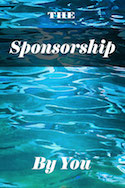
This week marks the anniversary of our first publication, two years ago. Can you believe it?
How lucky are we, being able to publish local original content, day after day. Publish nearly two hundred reviews, a huge parcel of poems, and enough daily columns to keep even the most fidgety Seattle reader eye-deep in words. We've had some triumphs, and some stumbles, but through it all one thing has remained constant: you.
It's because of you that we are able to sell sponsorships to the best crowd of advertisers the world has to offer. Everybody who wants to get the word out has a myriad of ways to do so. But our sponsors choose to share their work here; their new books, their best events, their opportunities for writers to gather and learn. Along the way, they directly pay for the great writing you see on this site.
Instead of running a call for sponsors this week, we just wanted to take an opportunity to thank our sponsors, and thank our readers. You're what makes this community great. Happy anniversary to us all.
(of course, we won't stop you from buying a sponsorship if you really want to ... We've nearly sold out our August-January block!)
Meet Karen Junker, the creator and director of Readerfest
Karen Junker’s life has always been devoted to books. Though the tiny Washington town where she grew up, DuPont, didn’t have a library when she was young, “I loved reading more than anything.” One of her high school classmates was Robert Heinlein’s niece, and Junker clearly recalls her meeting with the sci-fi great to be a turning point in her life.
“Some people collect comics and baseball cards, and I collect meetings with famous authors,” Junker tells me on the phone, just before relaying an anecdote about accidentally bumping into George R. R. Martin. She’s about more than just the big names, though. Junker is well-connected in the literary community: she knows agents and editors and publishers and booksellers. And she admits that she’s “not afraid to call anyone and ask them for anything.”
Junker says she “likes to introduce people that will help other people.” One of her favorite things to do is to organize events that place a famous writer next to a lesser-known writer, creating the possibility to inexorably alter the course of a career. She’s organized conventions and a popular series of writing retreats called Writers Weekend and all sorts of other literary events.
Junker doesn’t believe in genre. She recalls a moment when she was younger that taught her not to look down her nose at someone for the kind of books they read: “I was working in a bookstore in West Seattle and I was helping a regular customer there and I said, ‘you seem like a really smart woman. Why do you read romance?’ She pretty much dressed me down. And rightfully so!” That customer turned out to be president of the local Romance Writers of America chapter, and she invited Junker to attend writing workshops. “It really opened up my mind and respect for that genre.”
After putting on some romance events, Junker started to branch out. She scored a rare appearance from sci-fi author Mercedes Lackey at a writing group, and then she started to expand her scope into a regular series of writing workshops. And now she’s expanding her scope event further with Readerfest, a free family-friendly book festival at Magnuson Park on Saturday, September 9th. Junker just started planning the festival five weeks ago, but she’s filed with Washington’s Secretary of State for nonprofit status and plans are proceeding at high speed. “I started making phone calls and people are getting on board,” she says. “We’re adding people and sponsors every day.”
“I’m a big fan of the writing community, especially in our region,” Junker tells me. “I started Readerfest because the Northwest Bookfest was so cool, and I feel that this is something I can do to organize a little tiny thing to build that back up again.” She admits to being “scared” by how quickly Readerfest is growing, but “I’ve done these for so long that if you get good people who you know can talk about what they do, I don’t have to manage that. It takes care of itself.”
Inclusivity is important to Junker. Readerfest will feature an indigenous arts tent, and there will be talks by local native artists. The festival will feature conversations about “cultural appropriation in literature, and race and gender representation in steampunk.” The festival does have more sci-fi authors on its slate than Northwest Bookfest, but Junker is looking to expand that slate as much as possible. “I have some poets, I have some non-fiction writers and some comics. We have spoken-word storytellers coming. We don’t have a lot of literary fiction writers yet.”
So what should you do if you want to participate in Readerfest? Junker says interested parties should email her if they’d like a table. The Readerfest site will be updated soon with information for volunteers and, as soon as the organization gets its nonprofit status approved, the ability to donate for future Readerfests.
In the end, Junker says, she just wants to put on an event that will connect people to books that they’ll love. “I just felt the need in the community for this kind of event — one that’s family-friendly but not exclusive of any genre. I’m a fan of all types of writing, and there’s a reader for everything,” she says.
Save the date: Saturday, September 9th is Readerfest, a free and family-friendly book festival at Magnuson Park
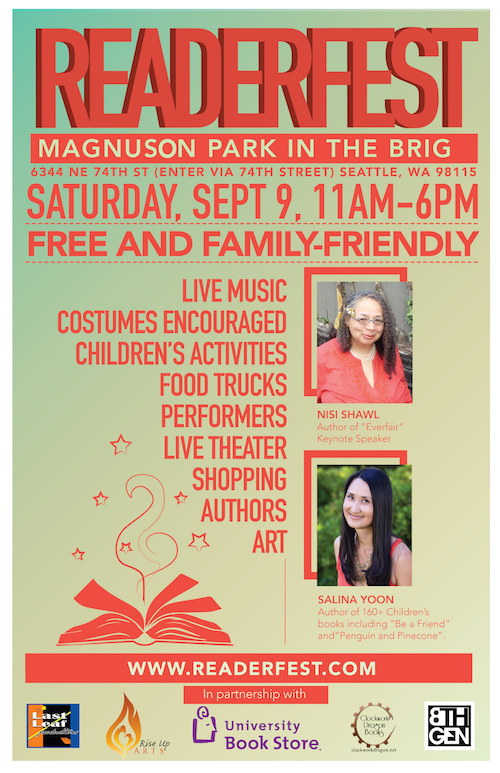
From 1994 to 2004, Northwest Bookfest was a centerpiece of Seattle’s literary year. Held in various locations throughout the city — from a pier on the waterfront to Washington State Convention Center to Magnuson Park — the general-interest literary festival brought as many as 20,000 Seattleites together over a weekend to meet a wide array of nationally published authors.
Northwest Bookfest eventually failed for a number of reasons, but ultimately those reasons all boiled down to money: Seattleites balked at a cover charge, sponsors including the Seattle Times backed out, publishers stopped sending as many authors on nationwide tours. In the years since, an ill-conceived attempt to relaunch the festival fell apart under its own weight.
Eventually, the hole left by Northwest Bookfest was filled by a number of smaller, more specific festivals including Short Run and the APRIL Festival, which itself reached the end of its life cycle earlier this year. These more local festivals — paired with genre-fests like NorWesCon and Emerald City Comicon — seemed to represent the new status quo of book festivals in Seattle.
But the Seattle literary scene of 2017 isn’t the Seattle literary scene of 2014, or 2011, or 2008. Maybe there’s space for a larger, more general-interest book festival in the calendar year again?
We’re about to find out.
On Saturday, September 9th, a new nonprofit organization will host a book festival called Readerfest at Magnuson Park. If you look at the lineup on the festival’s website at readerfest.com, you’ll see that the list of events and readers isn’t nearly as wide-reaching as Northwest Bookfest when it was in the height of its powers. Currently the slate of readers is heavy on the science fiction: novelist (and beloved Seattle Review of Books columnist) Nisi Shawl, children's book author Salina Yoon, and former Seattle author Cherie Priest, whose steampunk Clockwork Century series centered around a zombie-ridden Seattle, are among the headliners. But that list is still evolving, and more participating authors and publishers will be announced over the next few weeks.
Readerfest will be free and family-friendly. In addition to the authors, there will be panels discussing the publishing industry, how to get published, and the future of fiction. The show will also include food trucks, a play from Last Leaf Productions, and music from Jim Valley, a former member of Paul Revere and the Raiders.
If this all sounds good-but-a-little-random to you, there’s probably a reason for that: Readerfest is all coming together very, very quickly. The founder, a Seattle-area event organizer and author named Karen Junker, says it’s all been put together over a span of about five weeks, and support has been snowballing ever since. What you’ll find at Magnuson Park on September 9th will likely be more low-key and haphazard than the Northwest Bookfests you may remember. But Junker has a long history of organizing book festivals and literary events, and if there’s enough interest in Readerfest, she intends to start planning an expanded festival for 2018 on the morning of September 10th.
You can learn more about Readerfest at the festival’s website. Find my interview with Junker, where she discusses her history with books, what she expects Readerfest to be, and how you can be included in this year’s festival, right here.
The Sunday Post for July 23, 2017
Each week, the Sunday Post highlights a few articles good for slow consumption over a cup of coffee (or tea, if that's your pleasure). Settle in for a while; we saved you a seat. You can also look through the archives.
Go Independent Or Go Home
Not to beat you with a dead horse, as my high school chemistry teacher used to say (verbatim) — the issues novelist Matthew Galloway raises in this piece are frequently discussed on the Seattle Review of Books — but: Publishing is going through the kind of cataclysmic shift that certain industries refer to as “disruptive,” and no reader or writer can afford to play innocent bystander.
Galloway published his first book in the “Green Zone” enclave of Big Publishing, his second with “the resistance” (independent publishers and sellers). The metaphor is dramatic, and he’s quick to dismiss the financial issues faced by those for whom writing is a vocation, rather than an avocation. But he has a solid insider’s view of how Amazon is shaping the book market, and how that translates into costs and benefits for authors, publishers, and readers.
Here’s some good news: As soon as an industry player is declared disruptive, it’s a sure thing that they’re vulnerable to disruption by the next new thing. It’ll take more than a drone army to keep Amazon fresh, as long as those committed to the written word make pragmatic decisions — decisions that drive the right action from publishing, and not Amazon’s bottom line.
Then there’s Amazon. If you talk to your overworked/underpaid friends who work in the trenches of Big Publishing, you’ll be keenly aware that no decision — from “content” to book covers to publication schedules to sales/marketing strategies — gets made without considering the actual or looming impact of the alien overlord/distributor. If Amazon is “unhappy” about anything, or if the perception of unhappiness is wielded like a dictatorial cudgel, the publisher will scurry to find a solution. The message — and the reality — from Amazon is: Make Us Happy or Die Trying.
How Checkers Was Solved
The story of artificial intelligence is, at least for now, a story about human intelligence. Alexis Madrigal profiles Marion Tinsley and Jonathan Schaeffer — the world’s greatest checkers player and the world’s greatest checkers programmer. Chinook, the program that came between them, is a quiet third wheel as the two men race to the death (literally) for mastery of the board.
Schaeffer and Tinsley sat across from each other, and a large screen rendered the movement of the pieces. Tinsley drew first blood, besting Chinook in game five. But then in game eight, Chinook delivered a stunning win; it was Tinsley’s sixth loss in 40 years.
Despite the years of toil and dreams of success, Schaeffer felt sadness in that moment. “We’re still members of the human race,” he wrote in his book, “and Chinook defeating Tinsley in a single game means that it will only be a matter of time before computers will be supreme in checkers, and eventually in other games like chess.” Schaeffer might have won, but the humans have lost.
On my second birthday, we landed on the moon
To celebrate his fiftieth birthday, Mike Montiero wrote a letter that’s somehow both typically irascible and terrifically poignant — about landing on the moon, landing in America, and choosing your own “we.” If you can get through this without watching the Dead Milkmen video twice, and/or crying a little, you’re a better man than I am.
As I looked down at my new son, I realized that for the first time in my life I was in a relationship I could not run away from, could not put on someone else, could not half-ass, could not pretend to do right. Even if I managed to to get all those things right, what genetic malfeasance had I saddled this kid with? I looked at this little bundle of pink flesh and spit and poop and realized that inside him there was the genetic code for depression, Alzheimer’s, cancer, anxiety, and all sorts of other shit. I looked at that little kid and thought, little one you are fucked.
Digging in the Trash
Conversations about race and class and economic disparity are loud and angry in post-Trump (or, sadly, mid-Trump) America. David Joy strikes the tough balance between apology and defense in this honest essay about what “trash” really means.
Maybe that’s why what I read in a trade review recently struck me so hard. The reviewer didn’t like my book, and that’s all right. A whole lot of people don’t like my books, and that’s perfectly OK. My books aren’t for everyone. This reviewer didn’t like what he called my “Southern Poverty Law Center photorealism.” This is what got me, though. He wrote that I should “leave the peeling trailers, come down out of the hollers, and try writing about people for a change.” He actually italicized that word, people, to be sure and say that what lives in those trailers, what finds itself in a world consumed by hopelessness, addiction, and violence, those aren’t people at all. I’m not sure what he thinks men like my grandfather, boys like Darrell, Smokey, Bubba and Lyndon, men like Donny, like Paco are, other than to use his own words, “trailer trash.”
Frances Gabe, Creator of the Only Self-Cleaning Home, Dies at 101
Yes! Housework is “a nerve-twangling bore”! Let’s celebrate the life of the woman who recognized that ugly truth and did something about it: designed and built a house — her own — to end the tyranny of daily cleaning chores.
In each room, Ms. Gabe, tucked safely under an umbrella, could press a button that activated a sprinkler in the ceiling. The first spray sent a mist of sudsy water over walls and floor. A second spray rinsed everything. Jets of warm air blew it all dry. The full cycle took less than an hour.
Runoff escaped through drains in Ms. Gabe’s almost imperceptibly sloping floors. It was channeled outside and straight through her doghouse, where the dog was washed in the bargain.
Seattle Writing Prompts: The Hike In
Seattle Writing Prompts are intended to spark ideas for your writing, based on locations and stories of Seattle. Write something inspired by a prompt? Send it to us! We're looking to publish writing sparked by prompts.
Also, how are we doing? Are writing prompts useful to you? Could we be doing better? Reach out if you have ideas or feedback. We'd love to hear.
We interrupt this writing prompts to call your attention to:
We're running a short story contest based on Seattle Writing Prompts, judged by Matt Ruff! Come and join the party, we can't wait to read your stories.

You leave Seattle at the crack of dawn. The drive isn't far, but it's far enough, and in the high summer you need to get to the trailhead early. You were up late packing and repacking. Making sure the food is smart and balanced right, the water containers are clean and full, the first-aid kit and compass and elevation map and convertible zip pants and bulletproof bear bag and floppy brim hat and walking pole and tent and sleeping bag and gortex shell and wool socks and perfectly-broken-in-boots and technical fabric shirts and everything is perfectly rolled into your pack and ready to go.
You drive for a few hours. It doesn't take long before you're off the freeway and on a highway that becomes a windy mountain road. You have a high-clearance vehicle, so you can get up where some people can't. You park, making sure your pass is visible so you don't get a ticket, then you double check everything, put your phone in airplane mode (you'll use it as a camera, still, otherwise you'd power down), and take your first step on the gravel of the trailhead.
Seattle is one the best bases in the world for back-country hiking. You could go to Alaska, of course, but here in Washington you're just hours away from scenic accessible low-traffic worlds to explore. There's a reason REI is based here, after all.
It's something to do with the culture of this city, it's in our bones the way that the rain is on our skin. We love to get away. Be it a quick trip up to the Big Four Ice Caves with some out-of-towners, a beach trail on one of the San Juans, a jaunt up to Paradise when the wildflowers are exploding, or a multi-day pack-in where you'll be clearing huge vertical miles on the way to that elusive off-trail spot you love to visit every few years.
But stepping outside leads to so many situations, so many unknowns. We like to think our lives are contained and predictable in the city — of course they're not — but we give up that illusion when we go into the mountains. We know we're on geologic scale, now, and we talk about the things that fall off of mountains by the appliance that matches their size most closely: "Did you see that refrigerator that nearly took out Gina?"
So with that surrender to the natural wonder, we find one thing that we carry with us always, even into the most remote of locations: our stories.
Now then, most stories coming from the woods are of people enjoying themselves. But writers need drama in our imaginary lives. So, just for now, things are going to have to go very, very wrong....
Today's prompts
It started with a bad omen before they even left the city: hitting the bumper on the car behind them outside of the coffee shop. This uptight dude confronted them, made them stop and wait while he inspected it ("that's what they're made for, dude," Shelley said. "That's why they call them 'bumpers', right?"). Then traffic and construction over the pass, then that near wipeout backing down the logging road to let the jeep pass. "You think the crows circling above mean anything?" Hugo joked, pulling his pack on. "Those are ravens," said Shelley. "So, yeah, they mean something." Jorge laughed. "You guys are too damn superstitious," he said, hearing the crack of his sunglasses under his boot, which he didn't notice had fallen onto the gravel.
Geocaches were always a fun distraction, and a good reason to get out of the house and hike a nice trail. You'd find the weirdest little things — pins, plastic figures, buttons, patches, toys. But finding the cache on the peak of the trail, it looked like it hadn't been opened in years. The latch was caught, and it took some working to get it open. Inside, some very old packets of crackers, and a note: "I'm being held a half-mile due southeast. Call the police." It was dated three years ago.
"Hey, you guys better be careful," she told the college boys. "Get your food secured, you're gonna get bears coming through here." Their campsite, messy — and all the beer they packed in! — had food everywhere, and they didn't have a bear cannister. They assured her they would, and off she went. But coming back through the next day, she saw they left a mess. They also left their tents, and all their gear. Was that blood over there? Calling out, there was no response, but she knew that if they were nearby and needed help, she was all the help they were gonna get.
"Oh my god, I'm so sorry!" she said, coming across the naked man sitting by the lake. "Oh crap!" he said, reaching for his shorts and pulling them on, obviously embarrassed. "I've been here an hour and hadn't seen anybody, so I figured I was safe." Putting a bit of room between them, she dropped some iodine tablets in her bottle and filled them from the stream that fed the lake. The man was packing up when she walked past. "You hiking through?" he asked. "No," she said. "I am. Doing the whole trail. Started at the Mexican border. Getting close, now. How about you?" She gestured back the way the trail led in. "No, just on a day hike." Then she added. "I just came up to get some water. My boyfriend's waiting for me just over the ridge." She waved, and walked off through the small pass, to the switchbacks down. But about half way down, looking up, she saw a glint of light off of metal, and some movement at the top.
How fast things change. The day was hot, dry, blue sky. They were in shorts, and then inside of thirty minutes they were in a cloud. The trail, once as clear as a contrail in the sky, was now occluded and hard to find. How could they get so cold so fast? The cotton socks and light jackets they packed weren't enough. The compass on their phones wasn't registering at all. And when one of them put their foot through crusty ice into a water hole, they found out fast why people suggested wearing wool. "I think we're lost," one of them finally confessed. And in that, they both knew, it was going to be really hard to get found again.
Can you read a video?
For weeks now, friends have been telling me to read 17776, a longform experimental sci-fi story written and designed by Jon Bois. I was resistant because the story is, in general terms, about football. That is to say that it begins as a blog post titled "What football will look like in the future." And I cannot stand sports at all.
But just a quick glance at the beginning of 17776 will tell you that it's not really about sports. The banal football article literally disappears from view as it's swamped by repeating instances of the words "something is terribly wrong."
17776 then unfurls across a calendar, tossing the reader into the future. It's a magnificent use of the internet as a storytelling tool, in a way that I've never seen before. Football does play into the story — narrow swaths of the United States are carved out into football fields that are hundreds of miles long and which host football games that last many years — but it's a backdrop. Eventually, the narrative becomes a Vonnegut-like farce, an examination of the way we think about the future. I'd need to read it again to actually review it; the first experience of 17776 is too exploratory to really collect any meaningful critical thoughts.
But I do have one issue with the storytelling methods in 17776 that hasn't really been discussed much in the public sphere. One of the many attractive things about literature, for me, is that you can read at your own pace. Using certain rhythmic tricks, a writer or a cartoonist can slow a reader down a bit, but the reader ultimately plays the role of the conductor. We set the rhythm, we pause when we want to, we turn back or flip forward, we speed ahead eagerly or linger behind and savor.
The problem with 17776, for me, is too much of the reading experience is swamped with animations, and swaths of the story are told in scrolling text via YouTube videos. To me, that changes the form into something new. When a reader can't read at their own pace — when you can't easily turn back and re-examine lost pieces of dialogue, or when you get bored because the scrolling mechanism isn't fast enough for your tastes — you're not really reading, exactly, anymore. You're experiencing. It's more passive, more like watching TV.
Listen: if you care about sci-fi or experimental internet storytelling techniques or good fiction, you should read 17776. No matter how you classify it, it's worth your time. And one of the reasons why it's worth your time is that the form opens up important questions about the limitations and strengths of reading. That's an exciting conversation to have.
The Help Desk: If Cienna Madrid could force all Seattle to read one book...
Every Friday, Cienna Madrid offers solutions to life’s most vexing literary problems. Do you need a book recommendation to send your worst cousin on her birthday? Is it okay to read erotica on public transit? Cienna can help. Send your questions to advice@seattlereviewofbooks.com.
Dear Cienna,
This year, the Seattle Public Library chose Angela Flournoy’s The Turner House as the Seattle Reads selection — as in, the one book they wanted everyone in Seattle to read this year.
I’m dying to know: if you had the power to make everyone in Seattle read one book, what would that book be?
Dinah, Central District
P.S. If you ever wanted to start your own misanthropic version of Oprah’s Book Club, I’d be a charter member.
Dear Dinah,
I have been sitting on your question for months now and each week, my answer has changed. My favorite recommendations are spontaneous and personal – for instance, a conversation about my dead aunt's newly-discovered secret 70's love child sparked a recommendation to read Katha Pollitt's Pro: Reclaiming Abortion Rights (not because my cousin should've been aborted, but because my aunt had no safe, legal recourse other than adoption at the time).
So you can understand how encouraging an entire city of people to read just one book is daunting. The kind of people who could answer that question unblinkingly are the kind of people who have only read three books in their lifetime – for them, choosing a favorite is easy.
In past weeks, I would've recommended Amy Bloom's Lucky Us because it is so funny and beautifully written that I have actually confused lines in the book for memories of my own, or Kindred, by Octavia Butler, because Butler lived and died in Seattle and despite her powerful stories, not enough people in the region know her name or worship her writing.
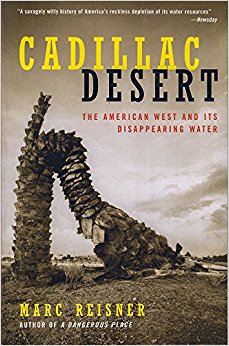
But if I had to choose a book this week, it would be Marc Reisner's Cadillac Desert, which is a nonfiction book about the diversion of rivers and damming of the American west. Reading about our untenable water policies is not as fun as reading Bloom or Butler would be, but it is a fascinating and necessary book for westerners. Seattle may not suffer from a water shortage, but it is the de facto democratic capital of the west and should be a leader when it comes to progressive water policy, and this book pretty clearly spells out the ecologic and economic disaster we're going to face if we don't re-evaluate how we use and think about water. Also: the only people I've found who've actually read this book are homeless-looking white men with REI budgets.
Along with a ton of other useful shit, like comprehensive sex ed and how to responsibly handle a credit card, Cadillac Desert is the kind of history lesson that should be taught in schools – or at least discussed among a wider audience than redwood-humpers with briar-patch beards and gear that costs more than my mortgage.
Kisses,
Cienna
Portrait Gallery: Anastacia-Reneé
Each week, Christine Larsen creates a portrait of a new author for us. Have any favorites you’d love to see immortalized? Let us know
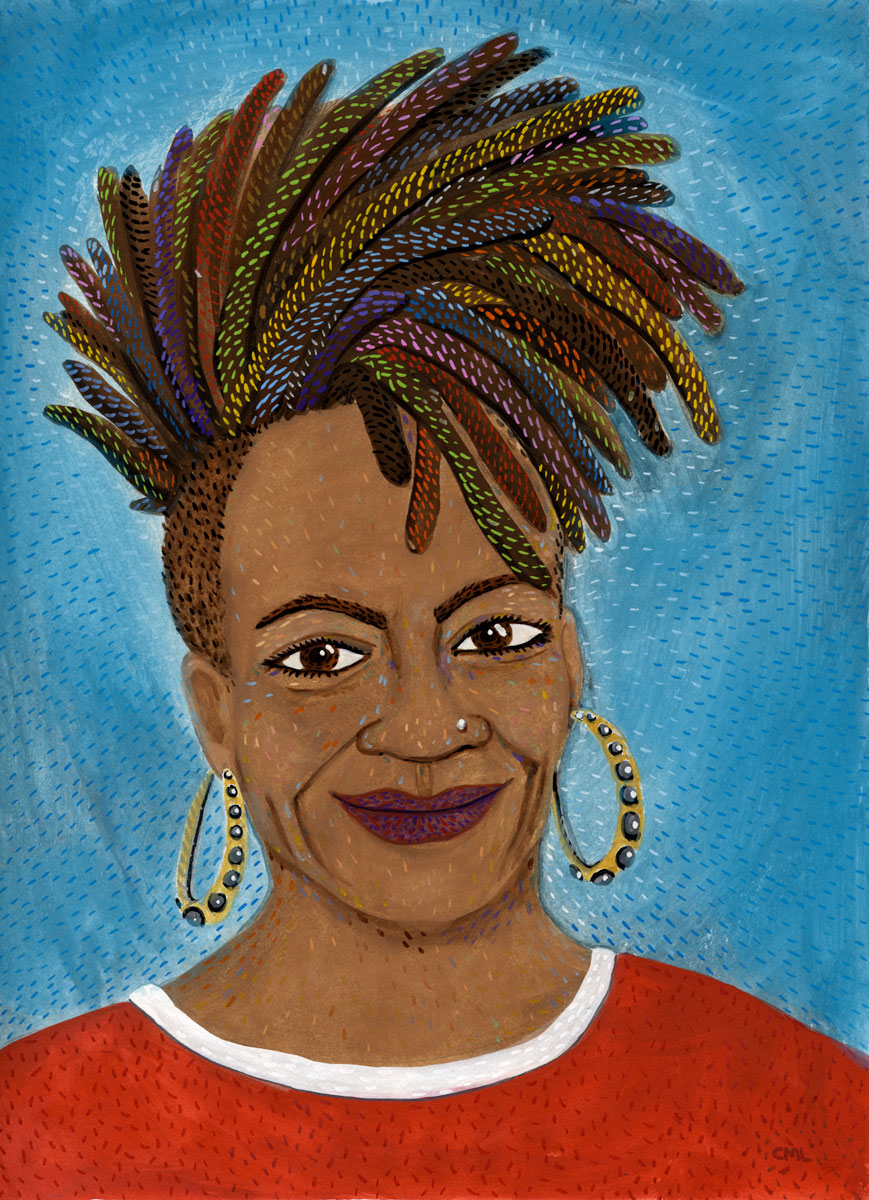
To celebrate the second release of her busy summer, Forget It from Santa Cruz publisher Black Radish, Anastacia-Reneé will be joined on Tuesday the 25th at Elliott Bay Book Company by three stellar Seattle-area authors: poet Jane Wong, memoirist Mattilda Bernstein Sycamore, and poet-slash-civil-rights-attorney Shankar Narayan. She’s not only generous with the spotlight, but Anastacia-Reneé is perfectly willing to give time and exposure to other authors who complement her work. Other writers would balk at giving three dynamos some of her stagetime. Anastacia-Reneé knows that every stage is big enough to share.
Elliott Bay Book Company, 1521 10th Ave, 624-6600, www.elliottbaybook.com. Free. All ages. 7 p.m.
